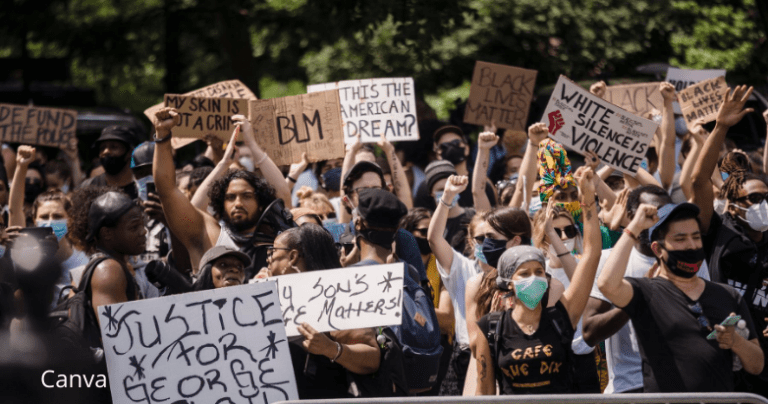
In Acts 6, Luke, the author of the book of Acts, tells us that,
In those days when the number of disciples was increasing, the Grecian Jews among them complained against the Hebraic Jews because their widows were being overlooked in the daily distribution of food (Acts 6:1).
Although Luke does not provide much by the way of details, it is reasonable to suppose that this division within the early Christian movement was racially charged—race, of course, here in the sense of one culturally distinct group being at odds with those of another culturally distinct group.
The dispute arose because the widows from among the Grecian Jews were being overlooked in the daily distribution of food apparently by the Hebraic Jews who were in control. Thus, they leveled a complaint against the Hebraic Jews.
Now, it is easy for the modern reader to overlook the fact that this dispute was racially charged because both groups were ethnically Jewish.[1] The fact is, however, that these two groups were culturally quite distinct from one another.
The most notable differences among them consisted of land, language, and culture: the Grecian Jews lived outside the land of Israel,[2] they spoke Greek, and they adopted customs found within Greek culture. All of which likely led to the Hebraic Jews claiming a sense of superiority. After all, they were from Palestine (i.e., the land that God had given to Abraham), they spoke Aramaic (which was very closely related to Hebrew), and they rejected the cultural incursion of the Greco-Roman world.
This means that the Grecian Jewish Christians were outsiders/visitors/guests. The leadership of the early church was apparently comprised of those who were identified as Hebraic Jewish Christians: that is, the locals.
Whether or not racial discrimination was the basis for the dispute in Acts 6 (and I suspect that it was but we cannot be certain), such divisions within humanity, in which one group considers themselves better than another, are common and often deeply problematic.
The Bible and race
I would like to begin this series of posts on race with the assertion that:
a biblical theology of race must account for the coming of Christ and the advent of the kingdom of God. If, in the kingdom of God, there is no distinction between Jew and Gentile (Gal 3:28), and if that kingdom has begun in Christ, then racial discrimination has no basis among God’s people today.
One would think that a series of posts on the Bible, justice, and race should be an easy topic to handle. After all, the notion that God has made all persons equal is very easy to propose even from just the Old Testament. The need to articulate the equality of all races from the New Testament, as I have done, seems like something that might have been more important for the early Jewish Christians than it would be for us today.
White ignorance?
The problem, as I see it, with contemporary discussions of race and the church is that most evangelicals do not see race as a problem. (Yes, the problem is that they don’t see the problem).
Though there are several reasons for this—as I will get to in this series of posts—I suspect that foremost among them all is ignorance.
After all, how many white evangelicals knew what “Juneteenth” was two years ago? And how many realize that the reason why people of color are reticent to take the Covid-19 vaccine is because of the Tuskegee experiments? And how many have heard of “sundown towns”?[3] or the Negro Motorist Green Books which helped people of color navigate the racist white path of the famed Route 66?
Until I started researching for these posts, I certainly did know any of these things. I suspect that most white evangelical Americans are simply ignorant when it comes to our racist past, let alone the prevalence of racism today. (In fact, I wonder how many white evangelicals, or even just white Americans, believe that racism, or at least systemic racism, went away with the end of slavery in the 19th century)
Now, in saying this I by no means intend to provide an excuse for the prevalence of racial injustice. My concern is to implore the white evangelical readers of this post to not stand in denial of the prevalence of racial injustices encountered by people of color today simply because they are unaware of it.
It is time for us to remove our blinders and see the facts for what they are.
Race and Gender
As I prepared for this series of posts on Race and the previous series of posts on Gender, I was struck by a deep irony. I realized that the very same statement which asserts the biblical equality of all races[4] could be used to affirm the equality of the genders simply by substituting the words “gender” for “race” and “male and female” for “Jew and Gentile” into the statement:
a biblical theology of gender must account for the coming of Christ and the advent of the kingdom of God. If, in the kingdom of God, there is no distinction between male and female (Gal 3:28), and if that kingdom has begun in Christ, then gender discrimination has no basis among God’s people today.[5]
The irony
When it comes to the issues of “justice and race” and “justice and gender” there are two aspects of the conversation that must be addressed. First, there is the biblical text. What does the Bible say about gender and race? Secondly, there are matters of injustice in society.
What I found ironic was that when it came to the biblical text most evangelicals readily accept the notion that the Bible affirms the equality between the races. Yet, many do not accept the very same argument when it is used to affirm the equality between the genders.[6]
Even more ironic, and perhaps tragically so, I realized that when it comes to the issue of injustice, especially systemic injustice, most evangelicals readily accept the notion that there is systemic injustice against women—though they often greatly underestimate the severity of the problem—but they then deny that there are systemic injustices between the races.
In other words, evangelicals tend to agree that racism is wrong, but they don’t agree that racism is a problem in our society. At the same time, they agree that gender discrimination is a problem in our society, yet, they assert that the Bible teaches inequality between the genders.
Why this series of posts matter
I have been arguing throughout this series of posts on justice that the Gospel is the proclamation that the kingdom of God has come in Jesus. He is the world’s true Lord. And He has begun to establish His kingdom through His life, death, resurrection, ascension, and the sending of the Spirit.
In addition, we, the people of God, are called to be the means through which God does the work of building His kingdom. And since this kingdom is one in which righteousness and justice reign, the people of God are called to be advocates for justice.
The problem is that racial injustice pervades our world and most white evangelicals are either ignorant of it, or in denial of it.
The result is that we (most white evangelicals) are either, in the least, failing to speak against such injustices, or, even worse, we are actually propagating it, by affirming the status quo.
Therefore, I ask that you read this post and the ones to follow with an open heart and an open mind. I realize that we all have strong convictions on matters such as these. I ask that you make every effort to evaluate those convictions as we proceed.
“Then the righteous will answer Him, ‘Lord, when did we see You hungry, and feed You, or thirsty, and give You something to drink? And when did we see You a stranger, and invite You in, or naked, and clothe You? When did we see You sick, or in prison, and come to You?’ The King will answer and say to them, ‘Truly I say to you, to the extent that you did it to one of these brothers of Mine, even the least of them, you did it to Me’ ” (Matt 25:37-40).
As I finish this post, I want to encourage the readers to click on the links above regarding the Tuskegee experiments, sundown towns, and the Negro Motorist Green Books.
If you have been blessed by this blog post and would like to see others benefit too, would please consider giving a tax-deductible contribution to support determinetruth ministries and make possible future posts like this? You can do so by following this link: https://tithe.ly/give?c=3648601
If you would like to have Rob speak at your church or organization please let us know by filling out the contact info on the Contact me tab on this site.
[1] There is something to be said for the fact that Jews throughout the dispersion (that is, Jews who live outside the land of Palestine) may well have intermarried to some extent with their local communities. This may explain why Ethiopian Jews are black and European Jews look like Europeans.
[2] It is always difficult to classify the land under discussion. The best term for it is “Palestine.” This is the designation given to it by the Romans. The only problem here is that the Romans didn’t name it Palestine until 100 years or so after the time of the NT. Calling it “Judea and Samaria” has too many modern-day political connotations. Calling it the land of “Israel” doesn’t work either since the nation of Israel has not existed for centuries at the time of the NT. I prefer the designation “Palestine” even though it is somewhat anachronistic.
[3] I do not suppose that “Wikipedia” is the source of infallible historical truth. Nonetheless, this link and the ones below are simply for the readers of this post to have a starting place for their own research.
[4] I will address in a future post the notion that there is only one “race” biblically speaking. For now, I will simply note that I am using “races” here in accord with the commonly understood notion that humanity can be divided into various people groups even though we don’t have absolute boundaries between these groups.
[5] My previous posts on “women and justice” can be found by following this link.
[6] I will note in a future post that this has not always been true. Slavery was justified by many “Bible-believing” Christians.















